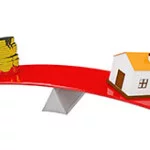 Jack Needham writes an article for The Adviser where he talks about the possible impact of changing negative gearing policy. The changes mentioned could result in a hike in rent and at the same time cause a decline in property values and a fall in overall new construction and the GDP.
Jack Needham writes an article for The Adviser where he talks about the possible impact of changing negative gearing policy. The changes mentioned could result in a hike in rent and at the same time cause a decline in property values and a fall in overall new construction and the GDP.
Possible effects of changes to the negative gearing policy
BIS Shrapnel forecasts that an alteration in the negative gearing policy could see rents (for units) moving up by as much as 10% in 10 years’ time. The Economic Impact of Limiting the Tax Deductibility of Negatively Geared Residential Investment Properties predicts that tenants of apartment units in Melbourne and Adelaide could be exposed to rental jumps to the tune of 9.6% and 10% respectively. The effect of negative gearing will be most badly felt by Sydney, with unit values coming down from $873,000 to $820,000.
New home construction industry
The same report estimates that the new home construction industry will suffer, too. BIS sees a fall to the tune of 4%. Furthermore, it feels that 175,000 fewer jobs will be up for grabs and GDP will take a plunge of $19 billion/annum. At the same time, government revenue will be squeezed by $1.65 billion per year.
Why the Labour party comes into the picture
The BIS Shrapnel report is modelled on the alterations to investor tax concessions. Here we mean concessions proposed by the Labour Party. The BIS Shrapnel estimate has drawn its share of criticism from the industry, with some citing the reports as being inconsistent with the Labour’s proposals, and others feeling that it won’t stand up to scrutiny. The report is laden with wild assumptions and can be torn to shreds if properly scrutinised.
For its part, the BIS has been very discreet, denying disclosing the identity of the commissioning body of the report. Of course, as can be expected, Labour has raised doubts over the report’s independence.
REIQ’s stand on the gearing issue
The Real Estate Institute of Queensland (REIQ) has re-emphasised that it will oppose the changes in negative gearing policy proposed by the Labour Party. The ‘Shrapnel’ report mirrors what the REIQ has long believed, and it is that property as an asset class may be coming to the end of its tether and will be left alone by investors. This is because the investors will become increasingly wary of rising rents and questions of housing affordability.
You can read the original article here.
With the level of supply coming down, it would be fair to assume that rents will rise. While there is a good chance that the proposal of the Labour government will be limited to new home construction, negative gearing, even if not applied to established housing market, can have its impact.
What changes in the negative gearing policy may mean for the established housing market (despite reports to the contrary)
If Labour has its way, we will see a rise in capital gains tax. The cumulative effect of negative gearing and capital gains tax will result in higher tax on investor-owned properties and hence their shrinking demand. The natural fallout will be shrinkage of the housing market. Labour can deny it all they want, but there is a good chance that those owning rental properties presently (and hence the “established housing” market comes under the radar, too) will feel the cramp, given the fall in property values and subsequent decline in the selling price of their properties.











